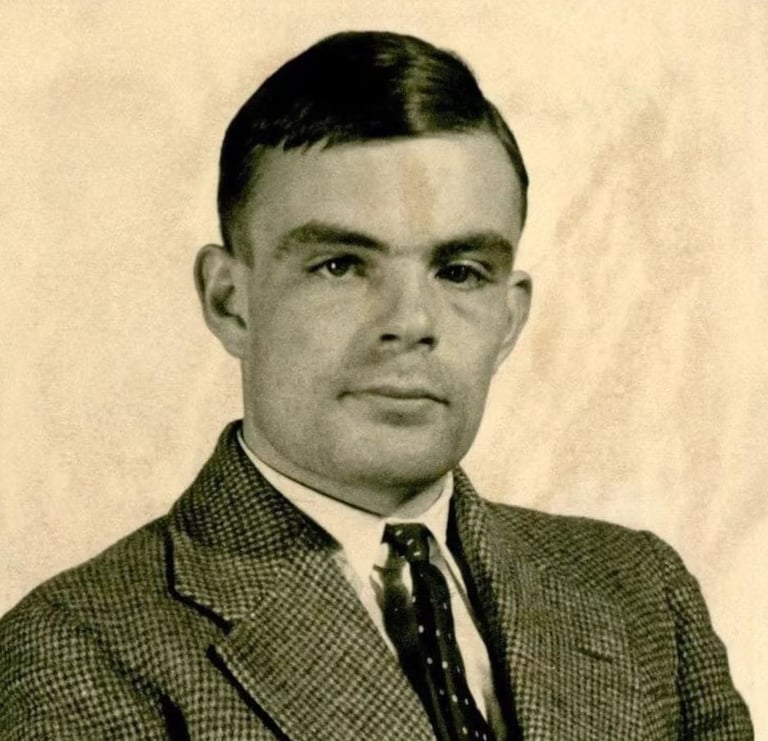Lesson 1
The Origins of Artificial Intelligence
How the Dream of Thinking Machines Was Born
What Is Artificial Intelligence?
Artificial Intelligence (AI) is the design of computer systems that can mimic human abilities like reasoning, decision-making, learning, and even creating. AI makes predictions by analyzing patterns in the data it was trained on, then using those patterns to guess the most likely response to your prompt—like a highly advanced autocomplete system.
To understand where we are today, we have to look at where this vision came from — and who shaped it. Most people are surprised to discover that AI was not a sudden innovation born in the age of the internet, but the result of decades of thought, experimentation, and vision stretching back to the mid-20th century.
Key Founders of AI
⚙️ Alan Turing (1912–1954)
“Can machines think?”
British mathematician and logician, widely considered the father of theoretical computer science
Broke German codes in WWII using logic machines
Proposed the Turing Test, a way of determining whether a machine’s behavior is indistinguishable from a human’s
Motivation: Intellectual curiosity, the boundaries of human vs. machine intelligence
Turing was an atheist
Spiritual note: Turing wrestled deeply with questions of identity, especially as he was persecuted for his sexuality. His work opens questions about imitation vs. true intelligence or personhood
John McCarthy (1927–2011)
“We should be able to program a machine to reason with common sense.”
Coined the term “Artificial Intelligence”
Organized the 1956 Dartmouth Conference, officially launching AI as a field of academic and scientific pursuit
Created LISP programming language used in early AI systems 1958-1960
Motivation: To replicate human-level reasoning in machines, believing logic could fully describe intelligence
Spiritual note: His work aimed to systematize reason without revelation — replacing human intuition and moral depth with logic-driven machines.
Key Verse:
“The fear of the Lord is the beginning of knowledge…” — Proverbs 1:7
Summary:
Though intellectually gifted, both Turing and McCarthy operated outside the fear of God. Turing, a brilliant codebreaker, lived a tortured life marked by rejection of biblical identity and moral order. McCarthy, driven by cold logic, sought to build a form of intelligence that dismissed the need for divine revelation altogether. Neither man pursued truth through God’s Word — instead, they elevated reasoning as the highest authority. This godless foundation shaped the direction of AI from the beginning: a pursuit of power and imitation without reverence for the One who created true life and wisdom.


“Alan Turing at 24—Princeton, 1936.
1936 — Alan Turing publishes On Computable Numbers. Introduces the Turing Machine, laying the mathematical foundation for computing.
1945 — Turing helps build the Bombe. Used for decrypting Nazi codes — demonstrates the power of machines to solve problems.
1950 — Turing writes Computing Machinery and Intelligence. Proposes the Turing Test as a measure of machine intelligence.
1955 — John McCarthy coins “Artificial Intelligence.” Sets the definition in a proposal for the Dartmouth Conference.
1956 — Dartmouth Conference. Turing’s ideas and McCarthy’s vision converge — AI is born as a formal field.
1958 — McCarthy develops LISP, a programming language for symbolic reasoning and early AI experiments.
1966 — ELIZA chatbot emerges. Simulates conversation — a first leap in natural language processing.
1969 — Shakey the Robot combines perception, reasoning, and action — early mobile AI.
1980s — Expert systems gain traction. Rule-based logic powers real-world problem-solving in industries.
1997 — IBM’s Deep Blue defeats Garry Kasparov. A landmark moment in AI outperforming human intellect in chess.
2011 — IBM Watson wins Jeopardy!. Demonstrates AI’s capability to understand and synthesize vast data.
2016 — AlphaGo defeats Go master. Demonstrates intuitive strategy and deep learning capacity.
2020 — OpenAI releases GPT-3. Revolutionizes language modeling with human-like text generation.
2023–2025 — Rise of multimodal AI. Combines text, code, and visuals in systems like Copilot and GPT-4.
Timeline of Artificial Intelligence




Citing The Sources
Freedom From Religion Foundation. (n.d.). Alan Turing. Retrieved from FFRF website tandfonline.comen.wikipedia.org+5ffrf.org+5heritage.humanists.uk+5
Humanist Heritage. (n.d.). Alan Turing (1912–1954). Retrieved from Humanist Heritage website heritage.humanists.uk+1en.wikipedia.org+1
Los Angeles Public Library. (n.d.). Born June 23: Alan Turing. Retrieved from LAPL website lapl.org+1wired.com+1
McCarthy, J., Minsky, M., Rochester, N., & Shannon, C. (1955). A proposal for the Dartmouth Summer Research Project on Artificial Intelligence. Retrieved from Stanford University archive hdsr.mitpress.mit.edu+15www-formal.stanford.edu+15wired.com+15
Dartmouth College. (n.d.). Artificial Intelligence (AI) coined at Dartmouth. Retrieved from Dartmouth College website newyorker.com+7home.dartmouth.edu+7securing.ai+7
Securing.ai. (n.d.). The 1956 Dartmouth Workshop: The birthplace of AI. Retrieved from Securing.ai en.wikipedia.org+2securing.ai+2en.wikipedia.org+2
Wired. (2011, October 25). John McCarthy – Father of AI and Lisp – Dies at 84. Wired.
📖 Biblical Verses to Support This Lesson:
1. Proverbs 1:7
“The fear of the Lord is the beginning of knowledge, but fools despise wisdom and instruction.”
(Core verse for the lesson)
2. Genesis 11:4–8 (Tower of Babel)
“Let us make a name for ourselves… But the Lord came down…”
Symbolizes mankind's attempt to elevate itself without God—parallel to AGI and synthetic wisdom.
3. Romans 1:22–23
“Professing themselves to be wise, they became fools, and exchanged the glory of the incorruptible God for an image…”
Warns of idolatry through intellect and imitation.
4. 2 Timothy 3:7
“Always learning but never able to come to a knowledge of the truth.”
Highlights how knowledge apart from God leads to spiritual blindness.
5. Jeremiah 9:23–24
“Let not the wise man boast in his wisdom… but let him who boasts boast in this: that he understands and knows Me.”
God's standard for wisdom is relational, not mechanical or purely rational.
6. Isaiah 5:21
“Woe to those who are wise in their own eyes and clever in their own sight.”
A direct rebuke of self-made intellect without divine fear.

